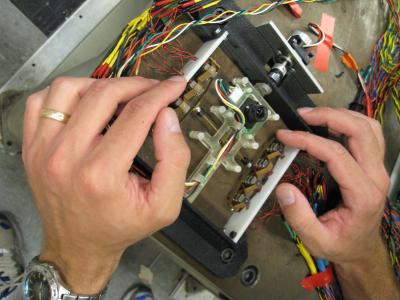By Kalwinder KaurJul 7 2012
In order to control the camera systems for better operation of robots, the muscle motion of the human eye was simulated by researchers using piezoelectric materials. The muscle replicating action will enable creating safe and highly efficient robotic tools for robotic rehabilitation and MRI-guided surgery.
 Joshua Schultz and Jun Ueda from Georgia Tech's School of Mechanical Engineering have developed a mechanism to orient a camera using muscle-like cellular actuators in a compact, lightweight package. Credit: Georgia Tech Photo: Billy Gallagher
Joshua Schultz and Jun Ueda from Georgia Tech's School of Mechanical Engineering have developed a mechanism to orient a camera using muscle-like cellular actuators in a compact, lightweight package. Credit: Georgia Tech Photo: Billy Gallagher
By adopting an innovative bio-based technology, the piezoelectric cellular actuator will facilitate the movement of a robot eye similar to that of a real one, which is critical to the new control system and eventually for the research studies as well. The research was carried out by Ph.D. candidate Joshua Schultz, led by assistant professor Jun Ueda, from the George W. Woodruff School of Mechanical Engineering at the Georgia Institute of Technology.
The research report was presented at the IEEE International Conference on Biomedical Robotics and Biomechatronics on June 25, 2012, in Rome, Italy.
In the presence of electricity, piezoelectric materials undergo contraction or expansion leading to transformation of input signals into motion. Based on this principle, piezoelectric actuators serve several applications, although they have limited applications in robotics owing to piezoelectric ceramic's minuscule displacement.
The research team developed cellular actuator concept inspired by biological muscle structure that integrates several small actuator units in parallel or in series.
The Georgia Tech team has created a versatile, high speed approach, which comprises a single-degree of freedom camera positioner capable of comprehending and demonstrating the performance and control of energy-efficient actuator technology, which is biologically inspired.
The research represents mechanisms that can upgrade the displacement of piezoelectric stacks to the ocular positioning system’s range. A cable-driven eye may generate the eye's kinematics, but rigid servomotors will refrain the researchers from testing the hypothesis for the eye motion’s neurological basis.
The Georgia Tech team has presented a novel cellular actuator technology-based camera positioner using a contractile ceramic for generating motion. The team deployed 16 amplified piezoelectric stacks per side.
Future research by his team will include creating design framework for highly integrated robotic systems like industrial, medical and rehabilitation, and intelligent assistive robots.
Disclaimer: The views expressed here are those of the author expressed in their private capacity and do not necessarily represent the views of AZoM.com Limited T/A AZoNetwork the owner and operator of this website. This disclaimer forms part of the Terms and conditions of use of this website.